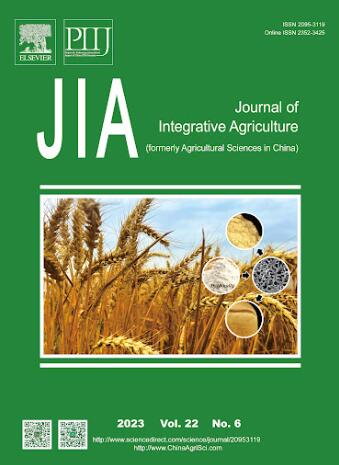芸苔素类固醇改善小麦小花在低氮胁迫下的氧化还原状态并缓解退化现象
IF 4.4
1区 农林科学
Q1 AGRICULTURE, MULTIDISCIPLINARY
引用次数: 0
摘要
降低氮肥施用量可以缓解环境退化和资源浪费等问题。但同时也会加剧小麦小花退化等问题,导致减产。因此,研究小麦在低氮胁迫下小花退化的机理并找出缓解措施,有利于实现高产和可持续发展。为了研究低氮胁迫影响小麦小花退化的生理机制以及外源铜皮素类固醇是否能缓解这种胁迫,研究人员采用了三种施氮量(N0,不施氮;N1,120 kg ha 纯氮;设计了三种施氮量(N0,不施氮;N1,120 千克/公顷纯氮;N2,240 千克/公顷纯氮)和外源喷洒试验(N0CK,不施氮,喷水;N0BR,不施氮,喷洒 24-环黄铜内酯(一种活性黄铜类固醇);N1,120 千克/公顷纯氮,喷水)。结果表明,低氮胁迫诱导产生大量活性氧。虽然小麦穗能合成类黄酮来对抗氧化胁迫,但其能量代谢(糖酵解和三羧酸循环)和抗坏血酸-谷胱甘肽循环受到抑制,使穗内活性氧水平持续升高,诱导细胞死亡,加剧小花退化。此外,黄铜类固醇在低氮胁迫下对小花退化起调节作用。外源叶面喷施 24-epibrassinolide 可促进穗内能量代谢和抗坏血酸-谷胱甘肽循环,增强能量充电,有效缓解低氮胁迫诱导的部分活性氧,从而减轻低氮胁迫引起的小花退化。总之,低氮胁迫破坏了小麦穗的氧化还原平衡,导致小花退化。芸苔素类固醇通过改善小麦穗的氧化还原状态来缓解小花退化。这项研究为平衡高产与可持续发展之间的矛盾提供了理论支持,有利于低氮在生产中的应用。本文章由计算机程序翻译,如有差异,请以英文原文为准。
Brassinosteroids improve the redox state of wheat florets under low-nitrogen stress and alleviate degeneration
Reducing nitrogen application rates can mitigate issues such as environmental degradation and resource wastage. However, it can also exacerbate problems such as wheat floret degeneration, leading to reduced yields. Therefore, investigating wheat floret degeneration mechanisms under low nitrogen stress and identifying mitigation measures are conducive to achieving high yields and sustainable development. To investigate the physiological mechanism of low nitrogen stress affecting wheat floret degradation and whether exogenous brassinosteroids can alleviate this stress, three nitrogen application rates (N0, no nitrogen application; N1, 120 kg ha pure nitrogen; and N2, 240 kg ha pure nitrogen) and exogenous spraying experiments (N0CK, no nitrogen with water spraying; N0BR, no nitrogen with 24-epibrassinolide (an active brassinosteroids) spraying; and N1, 120 kg ha pure nitrogen with water spraying) were designed. The results indicated that low nitrogen stress induced a large amount of reactive oxygen species generation. Although wheat spikes synthesized flavonoids to combat oxidative stress, their energy metabolism (glycolysis and tricarboxylic acid cycle) and ascorbate-glutathione cycle were inhibited, keeping reactive oxygen levels elevated within the spike, inducing cell death and exacerbating floret degeneration. Furthermore, brassinosteroids played a role in regulating wheat floret degeneration under low-nitrogen stress. Exogenous foliar spraying of 24-epibrassinolide promoted energy metabolism and the ascorbate-glutathione cycle within the spike, enhancing energy charge and effectively mitigating a portion of reactive oxygen induced by low nitrogen stress, thereby alleviating floret degeneration caused by low nitrogen stress. In summary, low-nitrogen stress disrupts the redox homeostasis of wheat spikes, leading to floret degeneration. Brassinosteroids alleviate floret degeneration by improving the redox state of wheat spikes. This research provides theoretical support for balancing the contradiction between high yields and sustainable development and is beneficial for the application of low nitrogen in production.
求助全文
通过发布文献求助,成功后即可免费获取论文全文。
去求助
来源期刊

Journal of Integrative Agriculture
AGRICULTURE, MULTIDISCIPLINARY-
CiteScore
7.90
自引率
4.20%
发文量
4817
审稿时长
3-6 weeks
期刊介绍:
Journal of Integrative Agriculture publishes manuscripts in the categories of Commentary, Review, Research Article, Letter and Short Communication, focusing on the core subjects: Crop Genetics & Breeding, Germplasm Resources, Physiology, Biochemistry, Cultivation, Tillage, Plant Protection, Animal Science, Veterinary Science, Soil and Fertilization, Irrigation, Plant Nutrition, Agro-Environment & Ecology, Bio-material and Bio-energy, Food Science, Agricultural Economics and Management, Agricultural Information Science.
 求助内容:
求助内容: 应助结果提醒方式:
应助结果提醒方式:


